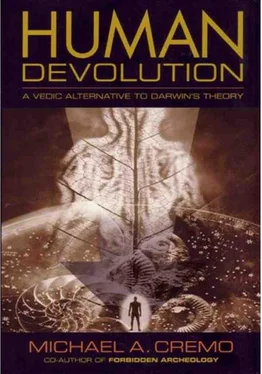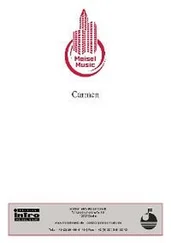Michael Cremo - Human Devolution - A Vedic Alternative To Darwin's Theory
Здесь есть возможность читать онлайн «Michael Cremo - Human Devolution - A Vedic Alternative To Darwin's Theory» весь текст электронной книги совершенно бесплатно (целиком полную версию без сокращений). В некоторых случаях можно слушать аудио, скачать через торрент в формате fb2 и присутствует краткое содержание. Год выпуска: 2003, ISBN: 2003, Издательство: Torchlight Publishing, Жанр: Старинная литература, на английском языке. Описание произведения, (предисловие) а так же отзывы посетителей доступны на портале библиотеки ЛибКат.
- Название:Human Devolution: A Vedic Alternative To Darwin's Theory
- Автор:
- Издательство:Torchlight Publishing
- Жанр:
- Год:2003
- ISBN:9780892133345
- Рейтинг книги:4 / 5. Голосов: 1
-
Избранное:Добавить в избранное
- Отзывы:
-
Ваша оценка:
- 80
- 1
- 2
- 3
- 4
- 5
Human Devolution: A Vedic Alternative To Darwin's Theory: краткое содержание, описание и аннотация
Предлагаем к чтению аннотацию, описание, краткое содержание или предисловие (зависит от того, что написал сам автор книги «Human Devolution: A Vedic Alternative To Darwin's Theory»). Если вы не нашли необходимую информацию о книге — напишите в комментариях, мы постараемся отыскать её.
Human Devolution: A Vedic Alternative To Darwin's Theory — читать онлайн бесплатно полную книгу (весь текст) целиком
Ниже представлен текст книги, разбитый по страницам. Система сохранения места последней прочитанной страницы, позволяет с удобством читать онлайн бесплатно книгу «Human Devolution: A Vedic Alternative To Darwin's Theory», без необходимости каждый раз заново искать на чём Вы остановились. Поставьте закладку, и сможете в любой момент перейти на страницу, на которой закончили чтение.
Интервал:
Закладка:
Unfortunately, it still has not happened. for this reason, James is a principal inspiration for this book, and particularly this chapter, in which I have tried to give a small indication of the actual scope and character of the unclassified residuum of observations related to the question of conscious human existence and origins. not only much of science but much of religion has turned its back on this unclassified residuum, with unfortunate results for contemporary human consciousness. If this situation is to change, the impetus will most probably come from the world of science, a science that breaks radically with its long flirtation with materialism and once more opens its eyes to the full range of phenomena displayed to rational human inspection.
The ultimate effect of such a change would be recognition of the power of personality as an explanation for factual events. The primary characteristic of modern science is its refusal to consider personal causation of natural effects. James (1897) said, “This systematic denial on science’s part of personality as a condition of events, this rigorous belief that in its own essential and innermost nature our world is a strictly i mpersonal world, may, conceivably . . . prove to be the very defect that our descendants will be most surprised at in our boasted science” (Murphy and Ballou 1960, p. 47). James’s prediction is already coming true, and I believe it will be entirely fulfilled in the present century.
Lord Rayleigh (Physicist)
John William Strutt, third Baron Rayleigh (1842–1919), made many important contributions to physics. He studied mathematics at cambridge, and later became interested in physics. He did most of his work at a private laboratory, which he installed on his family estate. during this time, he corresponded frequently with physicist Jame clerk Maxwell. In 1871, he married Evelyn Balfour, sister of Arthur James Balfour, later prime minister of England. After the death of Maxwell in 1879, Rayleigh took his chair at cambridge. He served as President of the Royal Society from 1905 to 1908, and in 1904 he received the nobel Prize in Physics for his discovery of the element argon.
In 1919, Rayleigh became president of the Society for Psychical Research. His presidential address (Rayleigh 1919; in Lindsay 1970) gives a good summary of his own experiences and his general attitude toward the scientific investigation of the paranormal. Rayleigh began his address by noting the recent death of Sir William crookes, a fellow nobel laureate in physics who had also served as president of the Society for Psychical Research from 1896 to 1899. He recalled that his own interest in psychical research, awakened while a student at cambridge, increased further when he read crookes’s “notes of an Enquiry into the Phenomena called Spiritual during the years 1870–73.” He knew of crookes’s scientific reputation, and thought that such a careful experimenter was well equipped to guard against illusions. This gave credibility to his reports of psychical phenomena.
He thought the séances with the medium daniel dunglas Home were particularly credible. Skeptics claimed that crookes had been deceived, but Rayleigh said, “I found (and indeed still find) it difficult to accept what one may call the ‘knave and fool theory’ of these occurrences.” And it therefore seemed that “one must admit the possibility of much that contrasts strongly with ordinary experience” (Lindsay 1970, p. 231).
Rayleigh, desiring to perform his own experiments, engaged a well known medium, Mrs. Jencken. He invited her to his country house, where she stayed, on a few occasions, a total of fourteen days. Rayleigh’s séances with Mrs. Jencken gave some interesting results, but not as astounding as those obtained by crookes with Home. Rayleigh explained: “Before commencing, the room was searched and the doors locked. Besides Mrs. Jencken, the sitters were usually Lady Rayleigh and myself. Sometimes a brother or a friend came. We sat close together at a small, but rather heavy, pedestal table; and when anything appeared to be doing we held Mrs. Jencken’s hands, with a good attempt to control her feet also with ours; but it was impracticable to maintain this full control during all the long time occupied by the séances” (Lindsay 1970, p. 232). Rayleigh noted that paper cutters and other small objects would fly about the room. Most strikingly, lights would appear in the darkened room and drift about. “They might be imitated by phosphorus enclosed in cotton wool,” said Rayleigh. “But how Mrs. Jencken could manipulate them with her hands and feet held, and it would seem with only her mouth at liberty, is a difficulty” (Lindsay 1970, p. 233).
“Another incident hard to explain,” said Rayleigh (1919), “occurred at the close of a séance after we had all stood up. The table at which we had been sitting gradually tipped over until the circular top nearly touched the floor, and then slowly rose again into the normal position. Mrs. Jencken, as well as ourselves, was apparently standing quite clear of it. I have often tried since to make the table perform a similar evolution. Holding the top with both hands, I can make some, though a bad, approximation; but it was impossible that Mrs. Jencken could have worked it thus. Possibly something better could be done with the aid of an apparatus of hooks and wires; but Mrs. Jencken was a small woman, without much apparent muscular development, and the table for its size is heavy” (Lindsay 1970, p. 233). Rayleigh rejected the idea of hallucination. for one thing, all of the witnesses agreed afterwards on the movements they had observed. Rayleigh witnessed some séances with the Italian medium Eusapia Palladino, about whom we shall have much more to say. His cryptically stated conclusion was: “There is no doubt that she practised deception, but that is not the last word” (Lindsay 1970, p. 235).
Rayleigh, an accomplished experimental scientist, recognized that there was a difference between ordinary physical phenomenon and psychical phenomena, which “cannot be reproduced at pleasure and submitted to systematic experimental control” (Lindsay 1970, p. 236). But he pointed out that in the history of science there were other cases in which rare sporadic phenomena, contradicting standard scientific opinion, eventually came to be accepted as real. He gave the example of meteors. Before early nineteenth century, scientists refused to believe reports of stones falling from the sky. Rayleigh observed: “The witnesses of such an event have been treated with the disrespect usually shown to reporters of the extraordinary, and have been laughed at for their supposed delusions: this is less to be wondered at when we remember that the witnesses of a fall have usually been few in number, unaccustomed to exact observation, frightened by what they both saw and heard, and have had a common tendency towards exaggeration and superstition” (Lindsay 1970, p. 236). But eventually scientists did come to accept the reality of meteorites. Rayleigh stated, “I commend this history to the notice of those scientific men who are so sure that they understand the character of nature’s operations as to feel justified in rejecting without examination reports of occurrences which seem to conflict with ordinary experience” (Lindsay 1970, p. 237).
To his scientific contemporaries, Rayleigh said, “If my words could reach them, I would appeal to serious inquirers to give more attention to the work of this Society, conducted by experienced men and women, including several of a sceptical turn of mind, and not to indulge in hasty conclusions on the basis of reports in the less responsible newspaper press or on the careless gossip of ill-informed acquaintances. Many of our members are quite as much alive to a priori difficulties as any outsider can be” (Lindsay 1970, p. 239).
Читать дальшеИнтервал:
Закладка:
Похожие книги на «Human Devolution: A Vedic Alternative To Darwin's Theory»
Представляем Вашему вниманию похожие книги на «Human Devolution: A Vedic Alternative To Darwin's Theory» списком для выбора. Мы отобрали схожую по названию и смыслу литературу в надежде предоставить читателям больше вариантов отыскать новые, интересные, ещё непрочитанные произведения.
Обсуждение, отзывы о книге «Human Devolution: A Vedic Alternative To Darwin's Theory» и просто собственные мнения читателей. Оставьте ваши комментарии, напишите, что Вы думаете о произведении, его смысле или главных героях. Укажите что конкретно понравилось, а что нет, и почему Вы так считаете.












